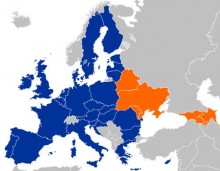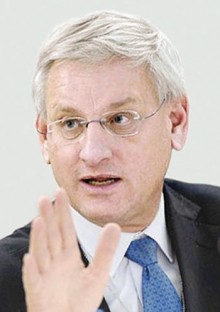My vision is clear. I want Europe to be a continent without dividing lines, where people, ideas, trade, and investment can move freely, across increasingly irrelevant borders. This would make Europe and its people more prosperous, innovative and secure.
The Eastern Partnership (EaP) was launched in Prague in May 2009 after an initial proposal by Sweden and Poland. The idea was to start a process of ever closer relations between the EU and our Eastern European neighbours: Azerbaijan, Armenia, Georgia, Moldova, Ukraine, and Belarus. Together, we have established that the EaP is based on a community of values, including democracy and human rights, and that it should accelerate the political association and economic integration of the Eastern European countries with the EU.
Over the years, this vision has been repeatedly challenged. Inside the EU, there is strong backing for the EaP, but we sometimes differ in our level of ambition. In the partner countries, public support for coming closer to the EU is strong, but vested interests often block or slow down necessary reforms. We also face a growing outside pressure directed against closer cooperation between the EU and the countries of Eastern Europe. The Russian Federation currently seems intent to use all instruments at its disposal in a brutal attempt to sway our partners from their European path. This campain is based on a zero-sum logic, quite alien to the win-win approach of the EaP. The Deep and Comprehensive Free Trade Areas are fully compatible with Free Trade Agreements with other countries, and the EU welcomes the development of better trade relations among CIS countries; membership of a Customs Union, however, is a different matter. In the EU, we will continue to be very clear that it is the sovereign right of every country to choose its own path and that undue pressure is unacceptable.
The third Summit of the EaP will take place in Vilnius on November 28-29 this year. As we are approaching the Summit, we can look forward to an occasion to celebrate the start of a new era in the EU’s relations with European Europe.
On many fronts and despite the challenges, the Partnership has delivered more than we could have credibly expected during its first few years of existence. By the Summit we expect to have finalised negotiations on Association Agreements, including Deep and Comprehensive Free Trade Areas, with Georgia, Moldova and Ukraine, with negotiations still on-going with Azerbaijan. In principle the Agreement with Armenia could also be finalised, but there we now have serious doubts. These agreements are of an unprecedented scope and breadth. We will also have facilitated travel between the EU and all EaP partners except Belarus, which has still to reply to the EU offer of a Visa Facilitation Agreement made back in 2011. Cooperation is also increasingly intense in a large number of projects, platforms, panels and seminars. Civil society is strongly involved and this engagement of our wider societies is an essential asset of the Partnership. Additionally, the EaP has put this region much higher on the internal EU agenda, in stiff competition with all other matters and regions requiring the EU’s attention and engagement.
At the same time, it is clear that much remains to be achieved. For the promises of the EaP to fully materialise, both the EU and the partner countries must leave our respective comfort zones. The EU must be ready to more fully embrace these European states and their citizens, and enhance our political, practical and financial support along the way. At the same time, the partner countries must realise that the EU is not only a club for trade and big politics. It is a civilizational choice – in favour of competitive politics and fully democratic elections, the rule of law, the protection of minorities and a vibrant, and sometimes cheeky, civil society. Across the region, we need to see a much clearer commitment and more effective actions to strengthen respect for the common European values that we have all agreed to uphold. Real European integration requires much more than nice words and reforms that never leave the paper. And naturally, the criteria become stricter, the closer a partner country wishes to integrate with the EU.
In this context, I have during the last years been deeply concerned over signs of democratic back-sliding in Ukraine, where electoral shortcomings, instances of selective justice and a lack of reforms have led to a slow-down in the EU integration process. Our aim for the Summit is to see a clear reversal of this trend, and thus be able to sign the Association Agreement, thereby making Ukraine the first partner to complete that step.
Georgia and Moldova share a very high level of ambition in their relations with the EU. Georgia has also enacted impressive reforms over years, not least in its fight against corruption. However, the country must now further improve its democratic credentials by managing the transfer of political power without infringing on the rights of the new opposition. Moldova is very serious about its EU approximation, and has made more progress than any other partner towards a future visa-free travel regime with the EU. At the same time, the political crisis this spring showed that Moldova must still work hard to depoliticise its state institutions.
As for Armenia, relations with the EU have been noticeably upgraded since the launch of the EaP, but the recent U-turn in favour of Eurasian integration leaves us with a number of questions.
Azerbaijan has made it clear that its main interest in the cooperation with the EU is areas such as energy and economic modernisation. In this country, an economic boom has not yet been accompanied with more civil freedom, and the up-coming elections in October will be closely watched.
In Belarus, the longstanding EU demand for a release of all political prisoners has not been addressed, and there are few signs of meaningful reforms. As a result, the EU has adopted sanctions and a policy of critical engagement, and the EU’s bilateral cooperation with Belarus is limited.
Across the region, there is an urgent need to get serious about corruption and vested interests. And of course, solving the protracted conflicts affecting Armenia, Azerbaijan, Georgia and Moldova, is essential for the stability and future prosperity of the region.
The conclusion of Association Agreements with several of the partners will be an epochal step in our relations, but the potential of the agreements will be unlocked only in the process of implementation. This will require political courage, from the Eastern European partners and the EU alike, to implement reforms also when the costs seem to outweigh at least short-term benefits. Reforms are not always immediately popular with entrenched interest groups. The mutual opening up of markets in the EU and the partner countries will lead to benefits in the form of better opportunities for export and foreign investments, and cheaper and better quality imports for average consumers and businesses. However it will also – in the short run – expose previously protected national companies to stiffer competition. Another case in point is the protection of minorities and the obligation to fight discrimination, including regarding sexual orientation. This is a non-negotiable in the context of European integration.
Sweden is committed to staying strongly engaged, inside the Union and through bilateral support to the EU integration of Eastern Europe. By the end of this year, the Swedish government plans to adopt a new seven year strategy for development cooperation with the EaP region, committing up to 500 million euros for this purpose. This is in addition to the extensive support – currently under negotiation – that the EU is expected to contribute to the region in 2014-20. The new Swedish strategy will follow the cooperation Sweden is involved in with several of the EaP partners for a long time – in some cases since the early 1990s. The overall focus is on human rights, good governance, gender equality, civil society, the protection of the environment and the development of market economies. Sweden has also recently appointed a special Ambassador for the EaP, with the task to further enhance our contribution to the partnership in the EU and in relation to the partners.
For Sweden – and for the EU – there are no alternatives to a continued whole-hearted engagement with our Eastern European neighbours. Sharing the same continent, our destinies are intertwined. In the coming years, much of the focus should be on the implementation of mutual commitments in areas such as trade, mobility and further democratisation and protection of human rights. At the same time, we should start considering the next steps towards a reunited Europe, which could include an “EaP economic area.” In any case, the EU has an obligation to remain ambitious in our approach towards the Eastern Partnership, as long as that ambition is matched by even a single partner.
It is my deep conviction that we have all to gain from ever deeper relations in Europe and that, in a perhaps longer perspective, the door to the EU must remain open for any European country that wishes to join and that fulfil all criteria.








